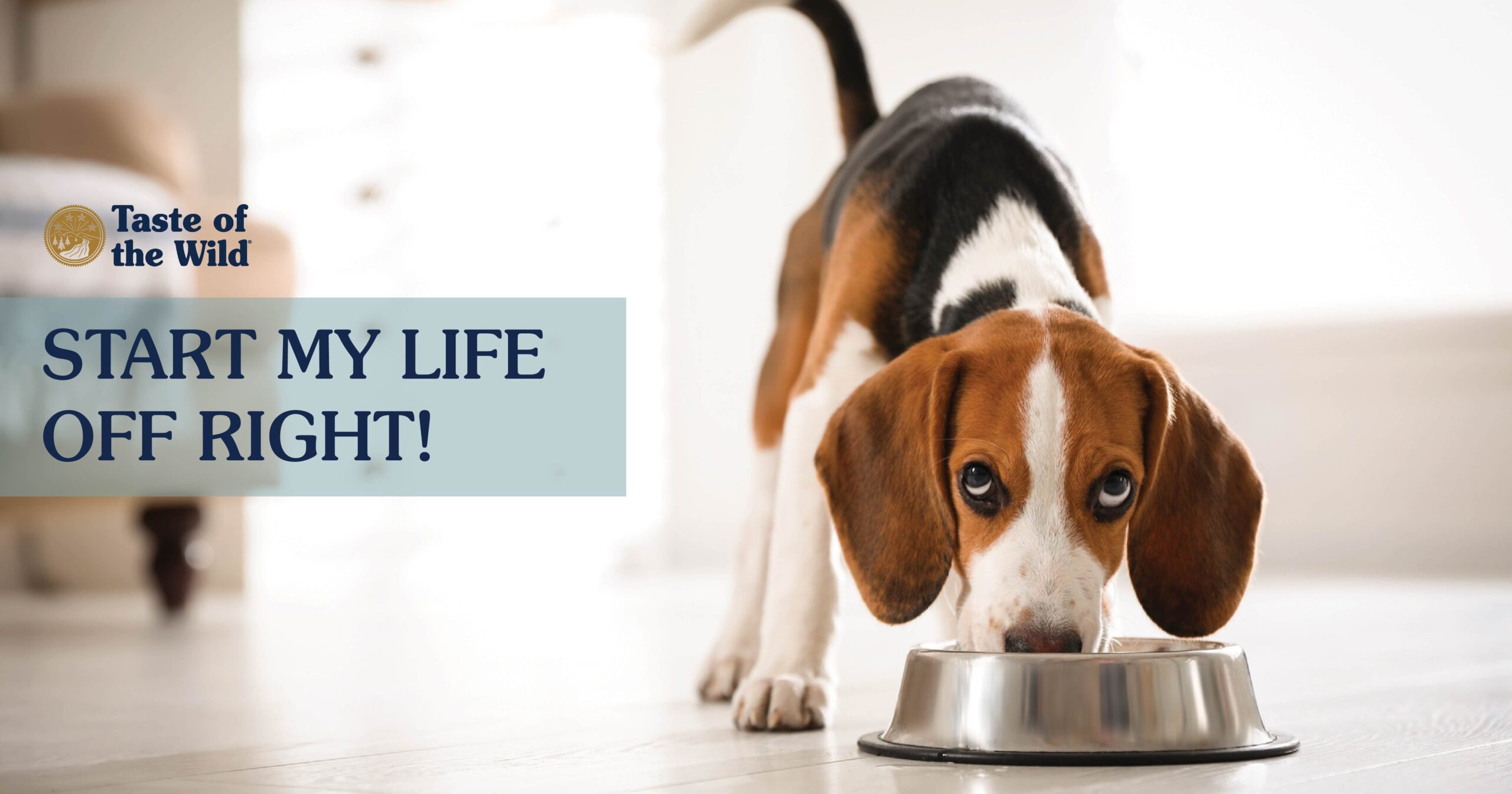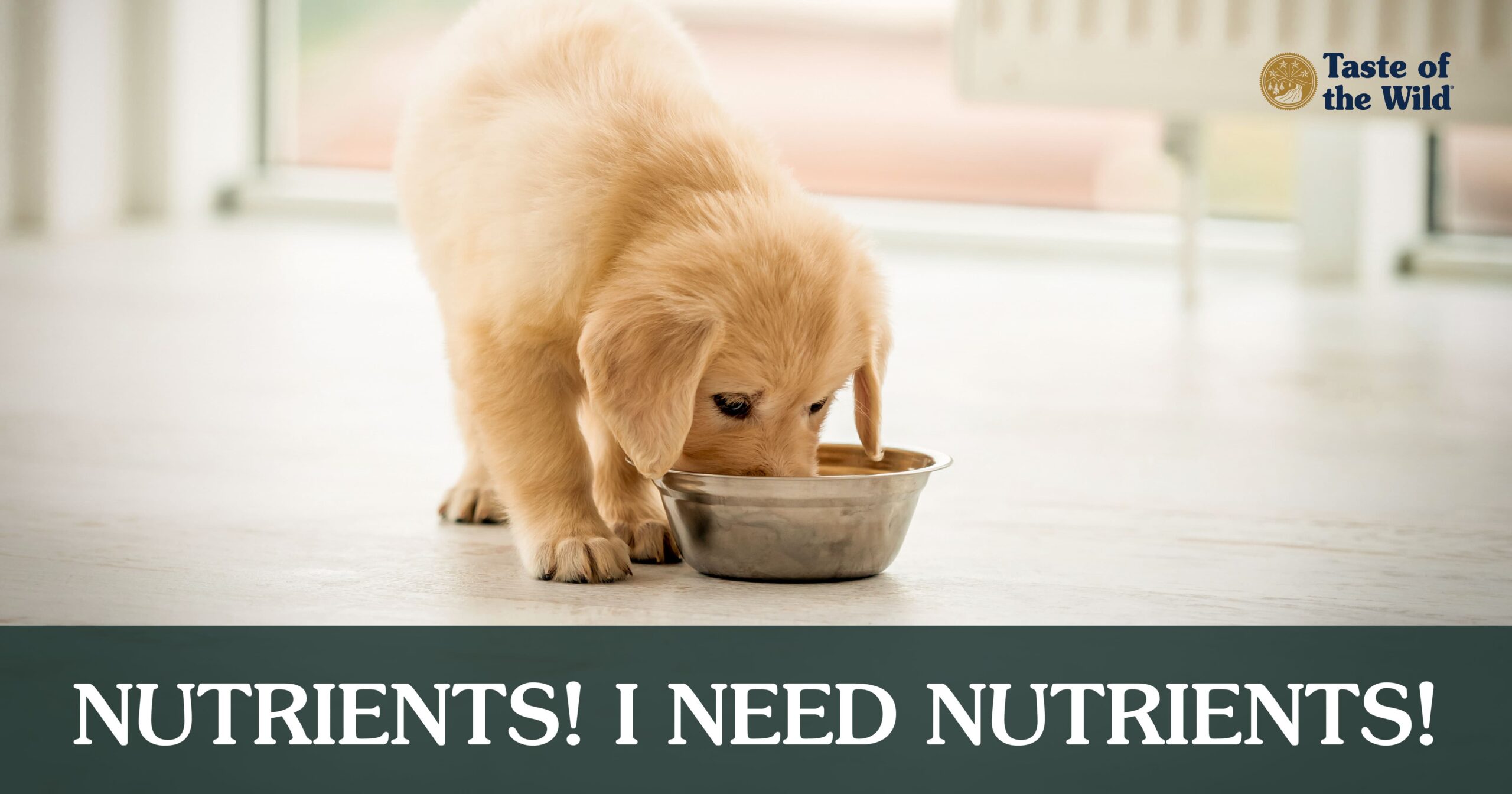The Building Blocks of Your Puppy’s Diet
Thursday, October 20, 2022 | Puppies

“An apple a day keeps the doctor away” is a phrase many of us heard growing up. It was our loved ones’ way of saying we needed the right nutrition as our bodies were growing and developing. The same holds true for puppies. Building the right nutrition into their diets now set them up for long and healthy journeys into adulthood.
On one level, your puppy’s nutritional needs are no different than a growing child’s. Like tiny humans, proper nourishment is vital to a puppy’s development, body composition and immune system. However, some of your puppy’s nutritional needs stack up a bit differently than a human’s nutritional needs.
What kind of nutrition does your puppy require? Your pupper needs a mix of fat, protein, fiber, calcium, carbohydrates, minerals and more to keep them growing strong.
The formula you choose should meet all of their nutritional needs. So, let’s start there!
Puppy Food or All Life Stages Food
What’s the difference between small breed puppy food, large breed puppy food and all life stages (ALS) puppy food? First, pet food companies take into consideration the puppy breed’s jaw size and gastrointestinal systems when deciding how big to make their kibbles. Therefore, you’ll notice a difference in kibble size between small breed puppy food and large breed puppy food.
Next, you’ll notice a higher calorie count in small-breed puppy foods compared to larger breeds. This is partly because smaller breeds tend to have a higher metabolism and need more calories to keep up with their higher energy levels.
With larger-breed puppy kibble you’ll also likely notice lower calorie and calcium content. The lower number of calories per cup allows bigger dogs to grow at appropriate rates and to stay lean, so they’re not putting too much stress on developing joints. Too much calcium in their diet can increase the risk of skeletal problems. Attention to these two factors is important for prevention of developmental orthopedic disease.
ALS food provides the right nutritional requirements for growth and reproduction throughout any stage of your pet’s life. Make note though, these foods tend to be higher in calories, so if your pupper is a couch potato you might want to reduce the amount of their daily food intake. Excessive calorie intake over time can lead to obesity and associated medical conditions like osteoarthritis. Reach out to your veterinarian if you have any questions on reducing the amount of daily food intake.
If there’s any doubt about which size breed dog you have — small, medium, large — ask your veterinarian for guidance.
Nutrients Matter in A Puppy’s Diet
So, now what nutrients are you looking for in a good puppy food? Here is a breakdown of some important elements of your puppy’s diet.
Fat
Fat is an energy source for puppies, who expend a lot of it. It also helps keep their skin and hair healthy.
Protein
Protein supports rapid growth and helps build your puppy’s tissues. It provides amino acids necessary to support a healthy immune system and synthesize hormones, antibodies and enzymes.
Fiber
Fiber helps maintain a puppy’s digestive health. Most puppy foods have an appropriate amount of fiber in them already. If your vet feels that your puppy needs a diet with more fiber, they will recommend a different option.
Calcium
Calcium helps your puppy develop strong teeth and bones. Calcium requirements do vary based on their breed size, however. Going back to the differences between small breed puppy food and large breed puppy food, choosing the right puppy food formula for your dog’s breed will be key in making sure they receive the correct amount.
Carbohydrates
Carbohydrates are important for a puppy’s active lifestyle. Carbs get broken down before protein or fat, so they’re your puppy’s first available energy source. In addition to puppy food, healthy sources of carbohydrates include vegetables, fruit and whole grains.
The Right Elements in the Right Amounts
After going through the nutritional information above, you may be wondering about the right portions of food to feed your puppy. Portion size recommendations vary based on age and weight of your puppy.
Refer to the recommended daily feeding amount on your pet food’s label. This will give you a rough idea of how much you should be feeding baby Fido. Some days your puppy may eat less and some days they may eat more. It’s all part of the growing process. If you have any questions about your puppy’s eating patterns though, be sure to reach out to your veterinarian.
Feeding your puppy correctly today will help set them up for good health for their entire life!
RELATED POST: A Taste of the Wild Guide to Choosing the Right Pet Food
The information in this blog has been developed with our veterinarian and is designed to help educate pet parents. If you have questions or concerns about your pet’s health or nutrition, please talk with your veterinarian.





